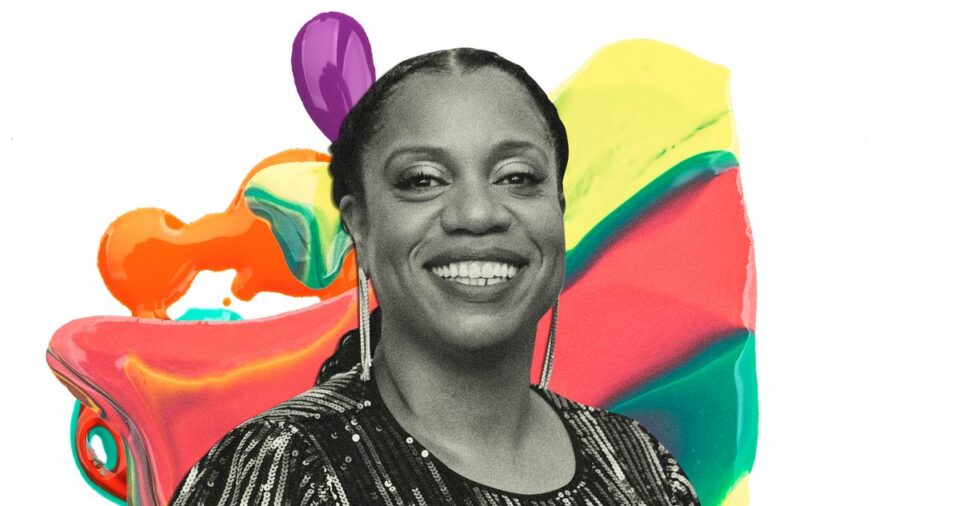In the past two years, the Brooklyn Academy of Music has offered some of its coolest programming ever: “Eldorado Ballroom” by Solange Knowles, a music series curated by Hanif Abdurraqib, and a staging of Lorraine Hansberry’s final work. Much of that curation can be attributed to Gina Duncan, the organization’s first Black president.
Duncan had studied film in college and dreamed of becoming a director or producer. She spent three years as an associate producer at NFL Films — “Yeah, I got to hang out with football players, but I was also making these films that were deeply rooted in the arts” — before moving to Los Angeles, where she kept editing NFL Network broadcasts at night to pay the bills. After relocating to New York to work in theater production, she stumbled into a job as a film programmer at an arthouse cinema outside the city. She hasn’t looked back since, bringing that experience to her roles at BAM, first as vice president of cinema, then as VP of film and strategic programming, and, finally — after a two-year stint as producing director at the Sundance Film Festival — as president. Born in the Bronx and raised mostly in Delaware, Duncan currently lives alone in Rockland County, New York. Here’s how she gets it done.
On the first show she saw at BAM:
I moved to Brooklyn on accident. I was living in Los Angeles, and I was working on a show that brought me to New York. On one of the dark nights, I went to a program at BAM. This was the early 2000s. It was this really crazy show. It was Questlove with a live orchestra attempting to imitate the randomness of your iPod playlist. I think it was called “Shuffle Culture.” It was out there. I loved being in the opera house, looking around and seeing comedians and writers whom I enjoyed. I felt like I’d found my people.
On how she got into film programming:
When I got to New York, I was producing Off Broadway shows, working for a production company that did theater and film. The show was Mike Birbiglia’s Sleepwalk With Me. I got to learn so much about theater, but also the craft of comedy. When the show closed, I needed to find a job that would allow me to also take care of my grandmother who had Parkinson’s. I found an arthouse film center in Westchester County, near her, that had Jonathan Demme on the board, Janet Maslin, Steven Spielberg … they still had their foot in Hollywood. But it was this completely new thing for me, which was programming for an arthouse and programming for a local community. I didn’t even know that was a job.
It really started to click at that point. I always thought that I wanted to make films, because that would allow me to get the stories that I wanted on the screen in front of people whom I care about and also the whole world. When I was living in L.A., I realized how few stories get through — how hard it is to make a film. Then when I worked in theater, seeing how audiences interacted with the show, especially with Mike’s show, I started to love the connection between the audience and the artist. When you’re programming a film series, you’re speaking to the audience. When they get into the space, there’s this discourse and exchange. I brought that programming aspect into the film program at BAM, and now I’m looking to see how you bring that exchange more into other areas.
On her morning routine:
I wake up around 6:30 and I go downstairs. I have to have coffee immediately, and then I have quiet time. That’s just sitting still. It’s a little bit of journaling — mindful affirmations, gratitude practice. It’s important to not think about work right away. I also developed this habit of doing both Wordle and Connections. As dorky as this sounds, I use a habit tracker, so I go through those and remind myself of the things I need to do that day. As I have stepped into leadership roles, it is so easy to lose space for yourself and lose space for other people. This is what allows me to hold myself accountable. After my quiet time, I exercise, and then I get ready and start my workday.
On a typical workday:
I spend my day talking to people, going from meeting to meeting. So much of this job is just talking, talking, talking. I like to preserve Mondays and Fridays for any pressing emergencies that might come up. But otherwise, Monday is my day for heads-down work and Friday is my day for catching up and prepping for the next week. Tuesday, Wednesday, and Thursday are meetings. I have about eight direct reports, and they’re all working on initiatives and strategies that I need to check in on, and they need the time with me as their boss. Of course, the job doesn’t really stop at 6 p.m. I’m out either at a BAM show or another show in town, or having dinner with a funder, or a drink with an artist.
On her exercise routine:
I’m training for a 10K right now. Because it’s cold, I just started doing my new obsession, which is Tread 50 at Orangetheory. It’s just a 50-minute treadmill routine, but each time is a little bit different. During the pandemic, I also started doing a group session with a trainer. That’s been a really fun way to meet people, but also have someone make sure you don’t hurt yourself when you’re lifting. I need someone making sure I’m doing it right. In addition to that, I rediscovered my love for heated yoga. There’s a really great studio that opened near my house. I just don’t stretch anymore. The yoga is a way to remind me that that’s important.
On getting things done on her commute:
During the pandemic, I actually moved out of Brooklyn to the suburbs. I had the opportunity to buy a home, and as a single woman of color who’s not from generational wealth, it was something that I felt was really important. I’m about 30 miles outside of Brooklyn, so it takes me about an hour to get to work in the mornings. That’s been a really great way for me to do calls. I love using voice to text. I get a lot of messaging done at that time. And then also podcast listening, if I don’t have calls or other things that are top of mind. The drive home has also been great in terms of having quiet time to think and decompress.
On winding down:
Sometimes I run in the evening, which does help wind me down, especially if I’m frustrated or need to really think about something. That helps get things out of my system, so when I come home, I’m tired and sweaty and receptive to winding down. I also got one of those red lights that helps you fall asleep. I’m really conscious of getting eight hours, so I have a bedtime routine of what time I need to get in bed, what time to put down the phone, what time to have that light on. When I don’t do that, I might wake up at 4 a.m. thinking about work and then I’m not actually good to solve or handle anything the next day.
On the books and podcasts she’s into lately:
I’m currently reading three books — I find that I’m not always in the mood for the same story. I want to change it up. So I’m reading Belonging, by bell hooks; Desert Solitaire, by Edward Abbey. I just went out to Yucca Valley for the first time over the holidays, so it was great to start reading that while there. And then, randomly, a friend suggested this romance novel, Seven Days in June, by Tia Williams. I just started reading that and it’s light and fun.
For podcasts, I really enjoy Maintenance Phase. It started out looking at diet books and tearing them apart, and now it’s expanded to diet fads overall. I think it’s really well researched and I like the dynamic between the two co-hosts. I think there’s not enough real conversation around the harms of diet culture, whether you’re fat or not. I also like Heavyweight, hosted by Jonathan Goldstein. He’s helping people have difficult conversations, or uncover things from their past, or right wrongs. It’s kind of quirky and fun. And then obviously I listen to This American Life.
On weekends and making time to do nothing:
I resent when I have something on my calendar for the weekend, even if it’s something I want to do. I just don’t like it because I find myself fixated on it. So I try to have a stretch of time on the weekends, especially the mornings and afternoons, where I don’t have to do anything. On weekend evenings, I have shows, I’ll have a dinner with someone. I prioritize Sundays for myself. It’s a full day of quiet time, getting myself organized for the week. I’ve started a ritual of having a Sunday bath. I have a big, old tub that I just fill to the brim. I bought a desk for the tub, so I can put my laptop or a book or whatever on it. It’s a great space to think.
On the challenges of running a nonprofit:
The nature of fundraising has shifted, and as I encounter folks of my generation and younger, how we support institutions looks different from the generations before us. We have less time; we have cell phones and streaming and all these things that are not competing artistically with the experience of seeing shows but are competing for our attention, our time. So I think it’s going to take more and more people to do things than it did in the past — larger donor pools, perhaps larger boards to support these institutions.
On the advice she wishes she’d taken:
I went to Northwestern University, and I was meeting with the dean, and I was really adamant about wanting to major in film. As a freshman, I was like, “This is why I’m here. This is what I was hoping to do.” And she was like, “Don’t do that. Just take the classes you like.” At the time, I felt like, That’s rich for you to say, but as a child of immigrants who are paying a lot of money for me to go to this school, I gotta get a job. But I wish I had taken that advice. I actually give it a lot to folks I meet: Pursue things that you’re interested in, that you feel will expand your skill set. As long as you do that, you’ll find your way.
And the worst advice she’s ever been given:
I did have someone who told me that being overweight would hurt my job prospects. That was early on in my professional career, before I moved to L.A. It was just like, You know, folks don’t hire fat people. That was really bad advice, and I luckily ignored it and have been gainfully employed.
On the people who help her get it done:
My office manager, Ameena, coordinates everything that’s coming out of the president’s office. She manages my calendar and really holds me accountable, not just to the routine that I’ve set for work but also for myself, which I really appreciate. Clover, my mother, is my No. 1 fan and bodyguard. My best friend, Christina, who is a fashion designer and just the most stylish person I know, my cousin Candace who’s obsessed with makeup and luxury goods, as well as my good friend Ira who’s also a designer, they have become my beauty cabinet. When I got this job, I got nervous when I realized how much I’d have to be seen. Whenever I have an event, whenever I’m thinking about style, I go to them.
This interview has been edited and condensed for length and clarity.
Katja Vujić , 2024-02-19 12:00:17
Source link


